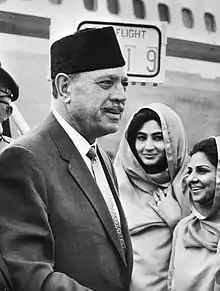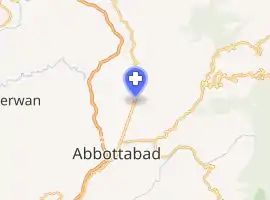Ayub Medical College
Ayub Medical College (Urdu, Hindko: ایوب طبی کالج, Pashto: د ايوب طبي کالج, or AMC) is a leading public medical institute located in Abbottabad, Pakistan.[1] It is one of the medical colleges affiliated to Khyber Medical University. AMC is home to 1,500 students in the MBBS and BDS programs, with clinical rotations at Ayub Teaching Hospital. Faculty members hold appointments at basic sciences and clinical departments. There are 212 full-time faculty members: lecturers, assistant professors, associate professors and professors.[2] [3]
.jpg.webp) | |||
| Motto | To Serve The Ailing Humanity بیمار انسانیت کی خدمت کرنا | ||
|---|---|---|---|
| Type | Public Government institute | ||
| Established | 1979 | ||
Parent institution | Khyber Medical University | ||
| Dean | Umer Farooq | ||
Academic staff | 212 | ||
| Students | 1500 | ||
| Undergraduates | 1350 | ||
| Postgraduates | 150 | ||
| Location | 34°12′17″N 73°14′00″E | ||
| Campus | 54 hectares (130 acres) Urban | ||
| Colours | |||
| Affiliations | KMU, PMDC, CPSP, PNC, HEC | ||
| Website | www | ||
History

In the late 1960s, a government study concluded that more medical colleges were needed in Pakistan to improve medical education, research and healthcare in the country. In particular, Khyber Pakhtunkhwa was in dire need of health reforms - a decision was thus made in 1972 to construct another medical college outside of the Peshawar region. In 1975, four cities were shortlisted for the site of the new college; Abbottabad, Dera Ismail Khan, Mingora and Chitral. A decision was made in 1978 to build the new college in Abbottabad and on 9 May 1979, classes started at Ayub Medical College. The first batch consisting of 100 students (class of 1984) was accommodated at the Education Extension Centre, while the present college campus and teaching hospital were later on constructed north of the town. On 30 December 1990, the new campus opened its doors to students and faculty. Abbottabad District Headquarters Hospital remained affiliated to Ayub Medical College upon opening of Ayub Teaching Hospital in 1998. AMC was named after former President Ayub Khan, who hailed from nearby Haripur. The first Principal of AMC was Dr. Abdul Jamil Khan. Today AMC hosts one of the largest medical college campuses in Pakistan.[1]
Academics
The Bachelor of Medicine and Bachelor of Surgery are awarded to students after five professional years of theoretical and clinical training. AMC features 24 clinical and 8 basic science departments with 212 full-time faculty members involved in teaching, patient care and advancing medical knowledge through scholarly clinical and basic science research. Annually, AMC educates and trains approximately 1000 medical students along with 200 resident physicians and fellows. In addition to offering the MBBS degree, AMC offers a BDS degree for dental students. In 2010, AMC introduced Community Oriented Medical Education (COME), a form of problem-based learning in a bid to convert from the annual system to a semester system. However the transition has been slow and faced a lot of problems regarding its acceptance and experience by the teachers and the taught. Graduates are eligible to apply for a medical license from the Pakistan Medical and Dental Council following the completion of the degree and one year of house job at a teaching hospital.
Undergraduate programs
Recognition
| Ayub Teaching Hospital ATH ایوب تدریسی ہسپتال | |
|---|---|
 | |

| |
| Geography | |
| Location | Abbottabad, Khyber Pakhtunkhwa, Pakistan |
| Coordinates | 34°12′15″N 73°14′19″E |
| Organisation | |
| Care system | Tertiary care |
| Funding | Ministry of National Health Services Khyber Pakhtunkhwa Department of Health |
| Type | Teaching |
| Affiliated university | Ayub Medical College |
| Services | |
| Beds | 1275 |
| Helipad | 1 |
| History | |
| Opened | 1998 |
| Links | |
| Website | Ayub Teaching Hospital |
| Lists | Hospitals in Pakistan |
AMC is fully recognized by the Pakistan Medical and Dental Council (PMDC). The College of Physicians and Surgeons of Pakistan has recognized many of its departments for post-graduate training in Medicine, Surgery, Obstetrics & Gynaecology, Oral & Maxillofacial Surgery and Pathology. The Royal College of Obstetricians and Gynaecologists of Britain has granted recognition to the Department of Obstetrics and Gynaecology at AMC for clinical training of MRCOG candidates.[1]
Departments
|
|
|
|
Attached hospitals
- Ayub Teaching Hospital (1998–present)
- District Headquarters Hospital, Abbottabad (1979–1998)
Institutes, schools and centers
- Abbottabad Physiotherapy Institute
- AMI Paramedical Institute
- Ayub College of Dentistry
- School of Nursing at Ayub Teaching Hospital
- Institute of Nuclear Medicine, Oncology and Radiotherapy (INOR)
Campus
The 133 acres (54 ha) campus consists of a medical school, teaching hospital, nursing school, dental school and paramedical institute with supporting amenities for all students and staff. The campus is also home to the Abbottabad CPSP Regional Centre and the Institute of Nuclear Medicine, Oncology and Radiotherapy.[1]
Medical school
The medical school building has four air-conditioned, spacious lecture halls with sophisticated audiovisual teaching aids, well-equipped laboratories and museums.
Teaching hospital
Dental school
Nursing school
The Ayub School of Nursing is the nursing education unit at AMC, however most teaching and training occurs at Ayub Teaching Hospital.
Library
The library provides various learning resources for both students and faculty. There are three main sections of library - the main hall, a reading room and a self-learning resource centre. The main hall houses a collection of over 10,000 books along with various medical journals including the Journal of Ayub Medical College or JAMC. The main hall also has a collection of encyclopedias, English and Urdu novels and poetry. The reading room is separated from the main hall by a glass partition and is mainly used by faculty members - it also houses the office of the chief librarian. The self-learning resource centre consists of 20 computers with access to the Digital Library of the Higher Education Commission.
Accommodations
The campus also provides hostel accommodation for up to 500 medical students, 300 internees, 100 nurses and a colony comprising 10 flats for non-teaching staff. The hostels are named after famous Pakistani personalities and regions.
- Quaid-e-Azam Hostel
- Fatima Jinnah Hostel
- Allama Iqbal Hostel
- Ayub Khan Hostel
- Khyber Hostel
- Doctors Hostel
Sports complex
A sports complex including the PCB-AMC stadium for cricket and hockey ground have also been built.
Research
Journal of Ayub Medical College
The Journal of Ayub Medical College (J Ayub Med Coll, Abbottabad, JAMC, p-ISSN 1025-9589, e-ISSN 1819-2718, NLM ID: 8910750 is published by the Faculty of Ayub Medical College since January 1988 and has been indexed by Index Medicus, Medline, Pubmed, Index Copernicus, Index Pakistan, PakMediNet and WHO EMRO besides many other indexing agencies. It is also recognised by Pakistan Medical and Dental Council as a 'Standard Medical Journal' and placed in category 'X' by the Higher Education Commission of Pakistan. This makes it only the second medical journal in Pakistan to have been indexed and published worldwide. It is a peer reviewed journal and has gained its place as a standard medical journal globally. JAMC is the first medical journal available with illustrations FREE online.[4]
Administration
- Dean and CEO: Umer Farooq
- Vice-Dean : Naseer Ahmad
- Vice-Dean (Dentistry): Iram Abbas
- Associate Dean (Undergraduate): Ashfaq Ahmad
- Associate Dean (Research ): Ruqiyya Sultana
- Associate Dean(post graduate): Alamzeb khan swati
Former Principals/Deans
- A. J. Khan (1979-1986)
- Mujahid Akbar (1986-1992)
- Syed Jamil-ur-Rehman (1992-1994)
- Muhammad Abdul Khaliq (1994-1999)
- Khurshid Khattak (1999-2002)
- Muhammad Aftab (2002-2003)
- Nazir Ahmed (2003)
- Muhammad Ayub (2003-2006)
- Abdul Rashid (2006-2007)
- Jaffar Khan (2007)
- Tariq Saeed Mufti (2007)
- Syed Humayun Shah (2008)
- Muhammad Ayub (2008-2011)
- Shahid Sultan (2011–2016)
Student life
Students and alumni of Ayub Medical College are referred to as Ayubians. Many partake is the various societies and clubs the college offers. Some societies which are medical oriented are governed by professors along with an associate society master who serve as "academic advisers" to students. Other societies are strictly governed by students. Students unions and political student bodies are banned from AMC. Due to its unique "crossroad" location, Ayub Medical College is one of the most ethnically diverse campuses in Pakistan with students from various backgrounds including, Balochs, Pashtuns, Hindkowans, Chitralis, Punjabis, Saraikis, Kashmiris, Kalash, Burusho, Shina and Baltis.
Societies and clubs
- Baloch Students Association(BSA)
- Abbottonian Medical Association (AMA)
- AMC Debating Club
- Ayubian Al-Qalm Society
- Ayubian Literary Society
- Ayubian Students Forum (ASF)
- Ayubian Welfare Society (AWS)
- Cancer Support Group of Ayub Medical College
- Edwardian Medical Association (EMA)
- Jammu & Kashmir Students Organization (JAKSO)
- Poor Patients Welfare Organization (PPWO)
- Regional Youth Welfare Organization (RYWO)
- Study Aid Foundation For Excellence (SAFE)
- Student Volunteers Group
- Shimla Medical And Welfare Organization (SMWO)
- Rotaract Club Of Ayub Medical College (RCAMC)
Publications
Karakoram is the annual college magazine published at Ayub Medical College and maintained by the Ayubian Literary Society.
Alumni
- Anam Najam, physician and psychiatrist
- Ayub Medical College Alumni Association of North America
See also
References
- "Ayub Medical College, Abbottabad". Ayub Medical College, Abbottabad.
- "Ayub Medical College Abbottabad Admission". entireeducation.com. Retrieved 27 September 2013.
- "Latitude and Longitude". satsig.com. Retrieved 27 September 2013.
- "Journal of Ayub Medical College Abbottabad 27(1)". www.ayubmed.edu.pk.
- (PHY-993) Use of the M. D. Title: The Wisconsin Medical Society: 1) defends the use of the M.D. title by physicians who graduated with an M.B.B.S. and are licensed to practice medicine in Wisconsin. (HOD,0495)